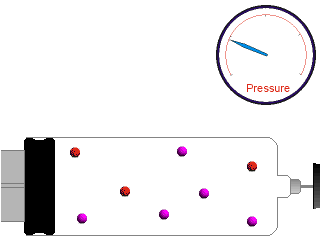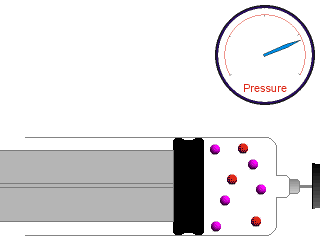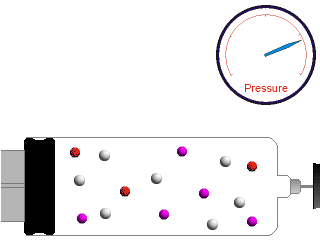The effect of pressure on solids and liquids is so small that we will ignore it. However, there is a very real and important effect when we increase the pressure of reactions that contain gases.
![]() It is very important to clear up some
confusion that students have about gas phase reactions. Although we write a chemical
equation with two sides – the reactants and the products – in reality when the
reaction is carried out, both reactants and products will invariably be in a single
container. This means that it is inappropriate to speak of "increasing the
pressure on the products (or reactants)".
It is very important to clear up some
confusion that students have about gas phase reactions. Although we write a chemical
equation with two sides – the reactants and the products – in reality when the
reaction is carried out, both reactants and products will invariably be in a single
container. This means that it is inappropriate to speak of "increasing the
pressure on the products (or reactants)".
In fact, when we refer to changing the pressure in a reaction, it is usually referring to the pressure change caused by changing the volume of the reaction container. Changing the volume doesn't change the number of particles in a container directly, but it does mean that the number in each unit of volume will be different Therefore it changes the pressure.
| When the volume increases, there are less molecules per unit volume. This means
the number of collisions per unit of surface area decreases, so the pressure is lower.
|
 |
| When the volume decreases, there are more molecules per unit volume. This means the number of collisions per unit of surface area increases, so the pressure is higher. |  |
Effectively, increasing the pressure by decreasing the volume increases the concentration. Remember though that it increases the concentration of everything that is in the gas phase, both reactants and products.
We already know that changing concentration has an effect on an equilibrium, and so we would expect it to do so here. However, we have changed both reactant and product molecule concentrations, so we need to be cautious. Consider this reaction:
2NO2 (g) |
N2O4 (g) | |
| 2 gas molecules | 1 gas molecule |
There are 2 molecules of gaseous reactants, but only 1 molecule of gaseous products. Therefore we expect the effect of an increase in concentration to have a greater effect on the forward reaction. An unbalanced effect on the reaction rate will effect the equilibrium. We would expect this reaction to change with a change in pressure.
But look at this reaction:
| H2 (g) + I2 (g) | 2HI (g) | |
| 2 gas molecules | 2 gas molecules |
Here there are two gaseous reactant molecules, but also two gaseous product molecules. The rate of the forward reaction should increase if the pressure increased, but there should be just as great an effect on the reverse reaction. If both rates are effected equally, then the equilibrium is not shifted. Remember that this is like running one step forward, and running one step back, as compared to walking one step forward, and walking one step back. Your actual rate is different in the two cases, but the net result is exactly the same – you remain at a standstill.
In reactions where the number of gaseous reactant molecules are the same as the gaseous product molecules, changing pressure should have no effect on the equilibrium.
The above shows us what to expect if we changed the pressure by changing the volume. There are two other ways to change pressure of gases:
| Without an inert gas, the molecules of reactant and product will have a certain
pressure.
|
 |
| When an inert gas is added, there are more molecules per unit volume. This means
the total number of collisions per unit of surface area increases, so the total pressure
increases. From Dalton's law of partial pressure,
we know that each gas acts independently of the other. Therefore, while the overall
pressure has increased, the concentration of the original molecules is no different than
it was before (the volume of the container has not changed, so there are the same number
of reactant and product molecules in the same volume).
|
 |
Since an inert gas does not change the concentration of reactant and product molecules, it will not effect the rate, so it should have no effect on the equilibrium.